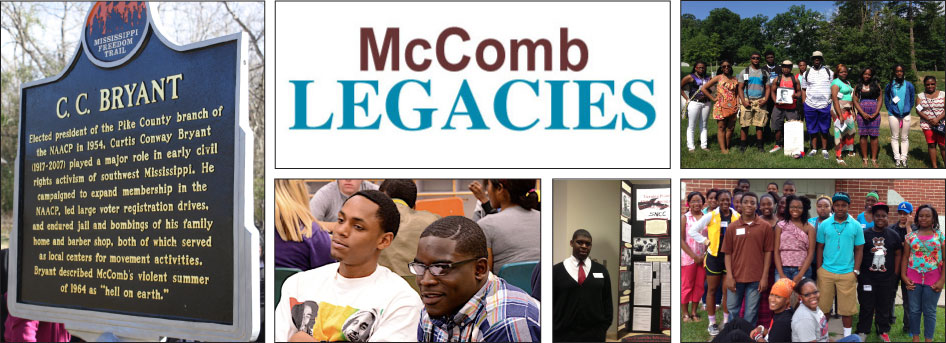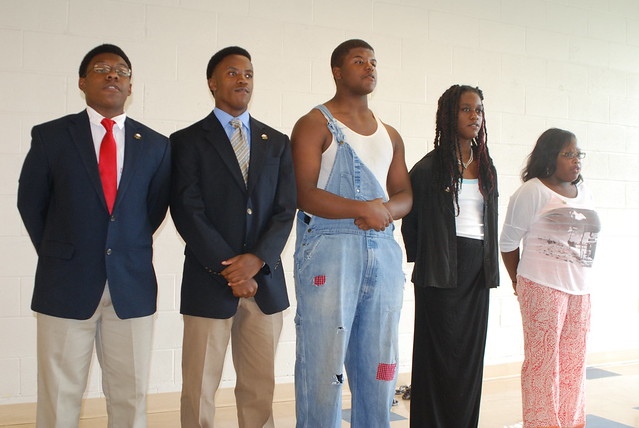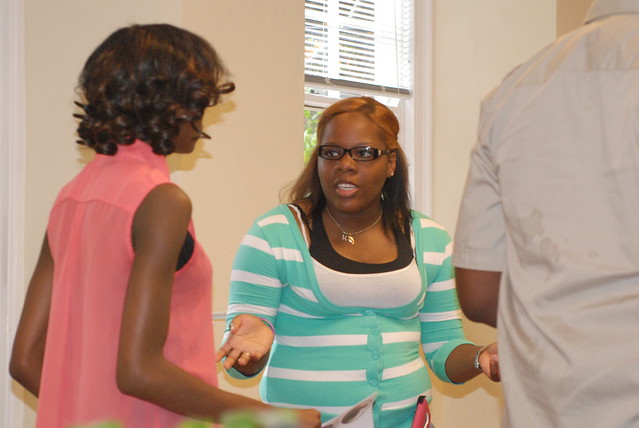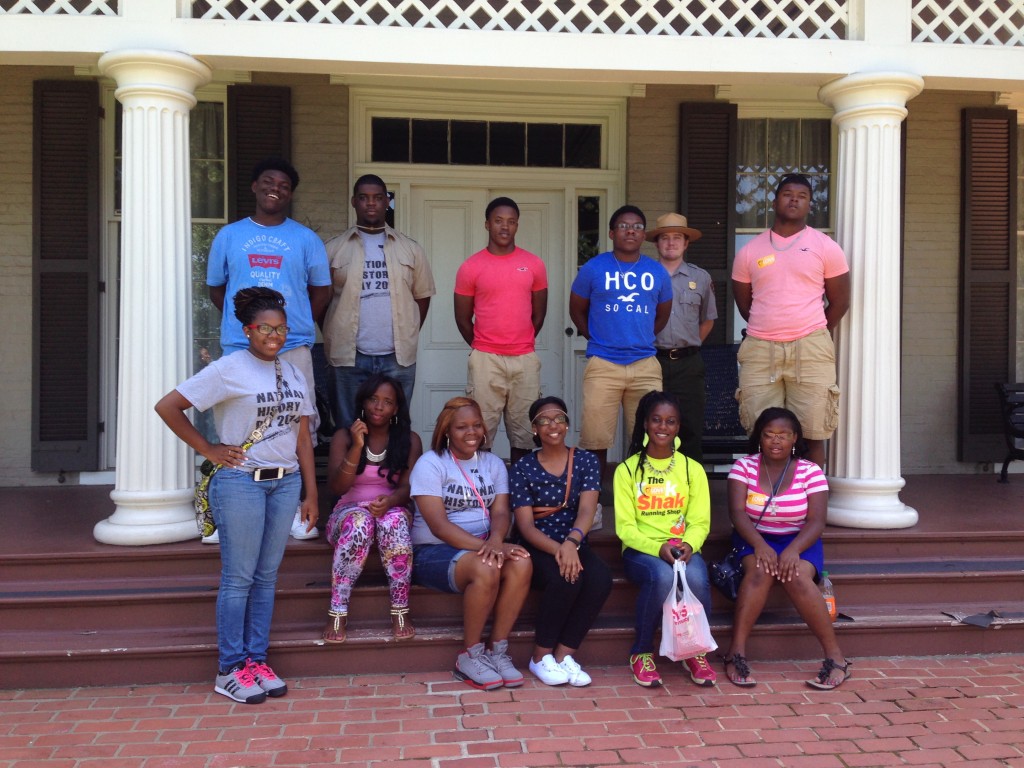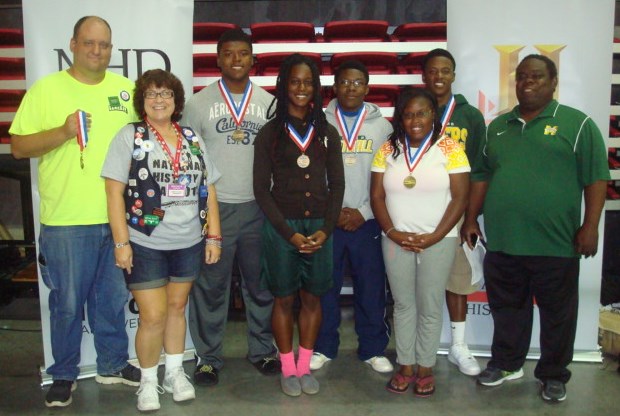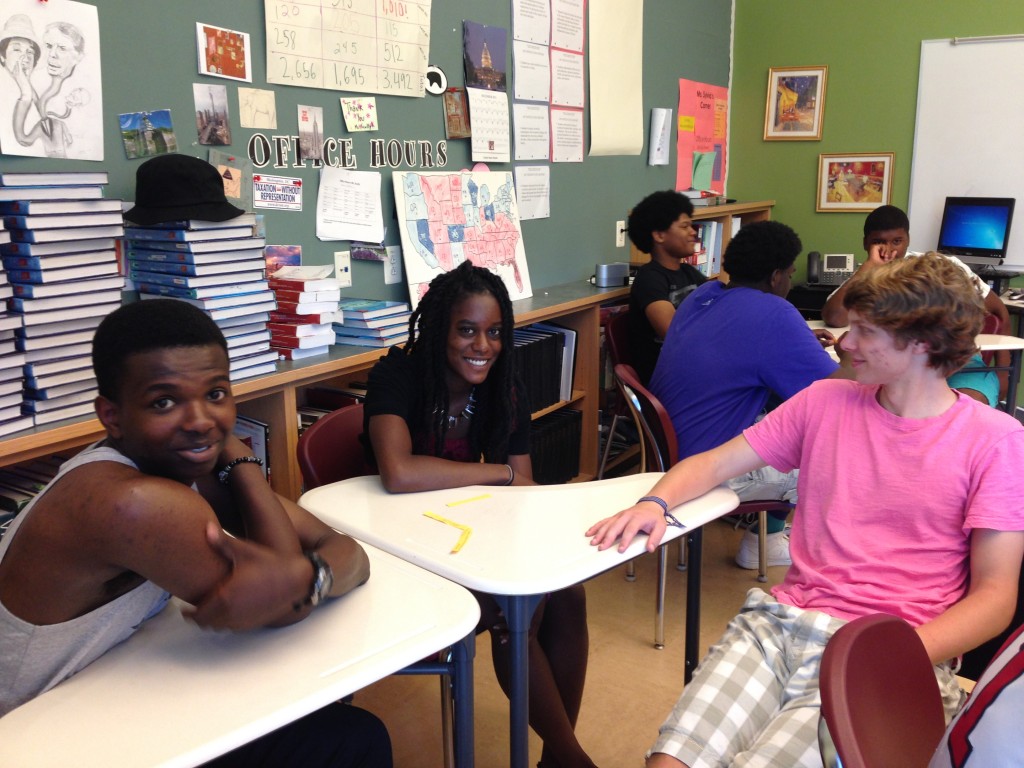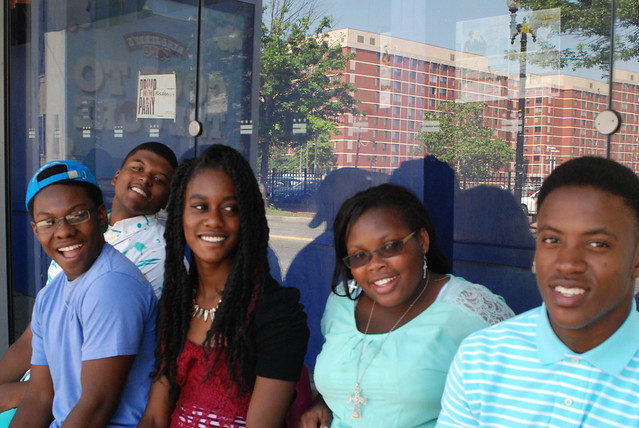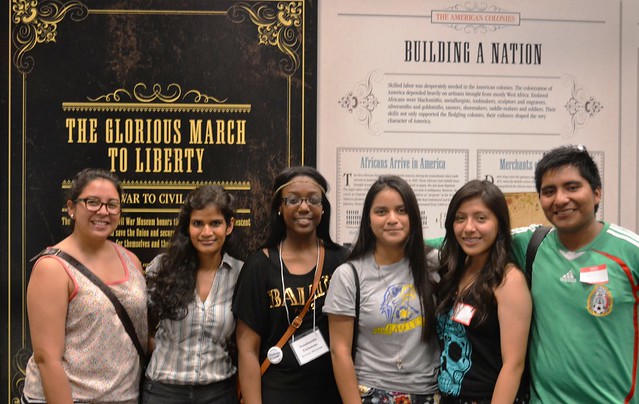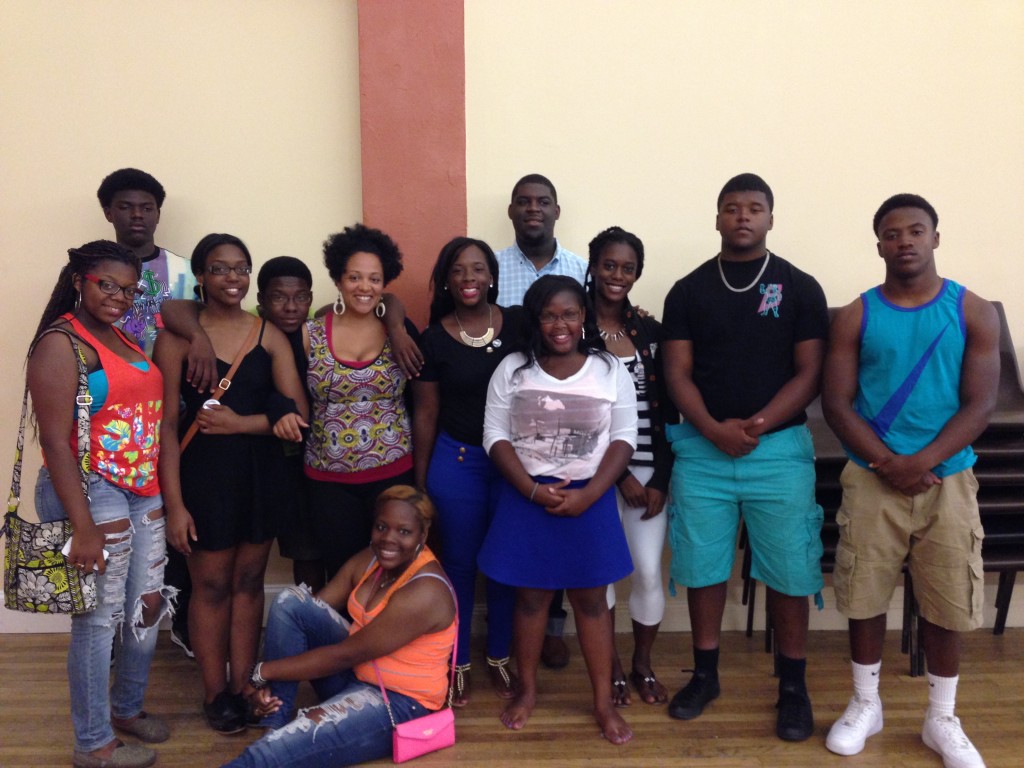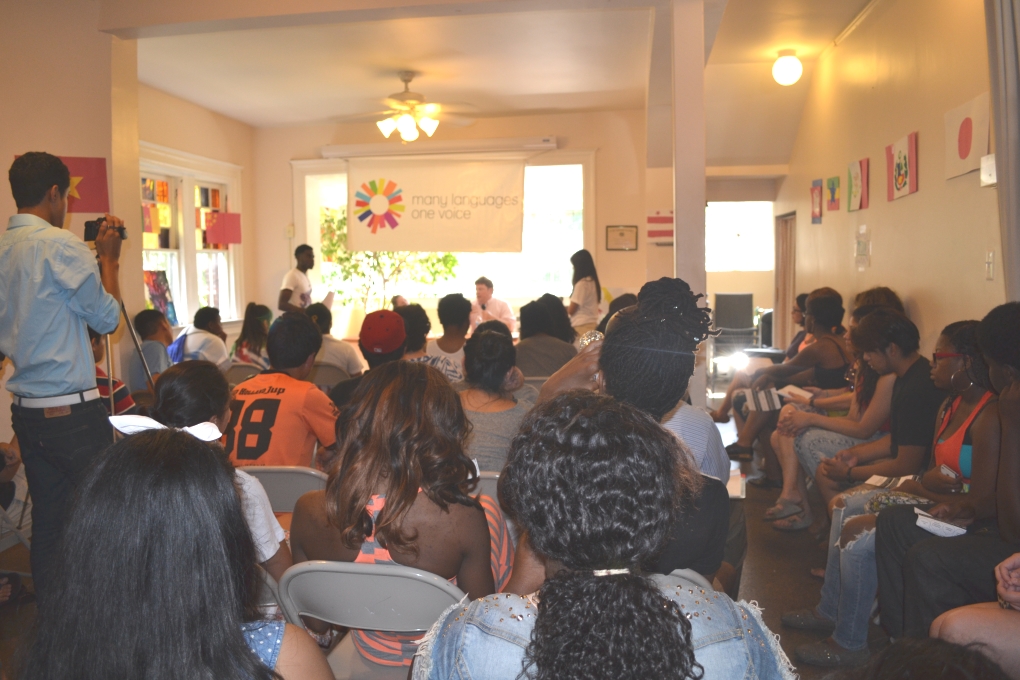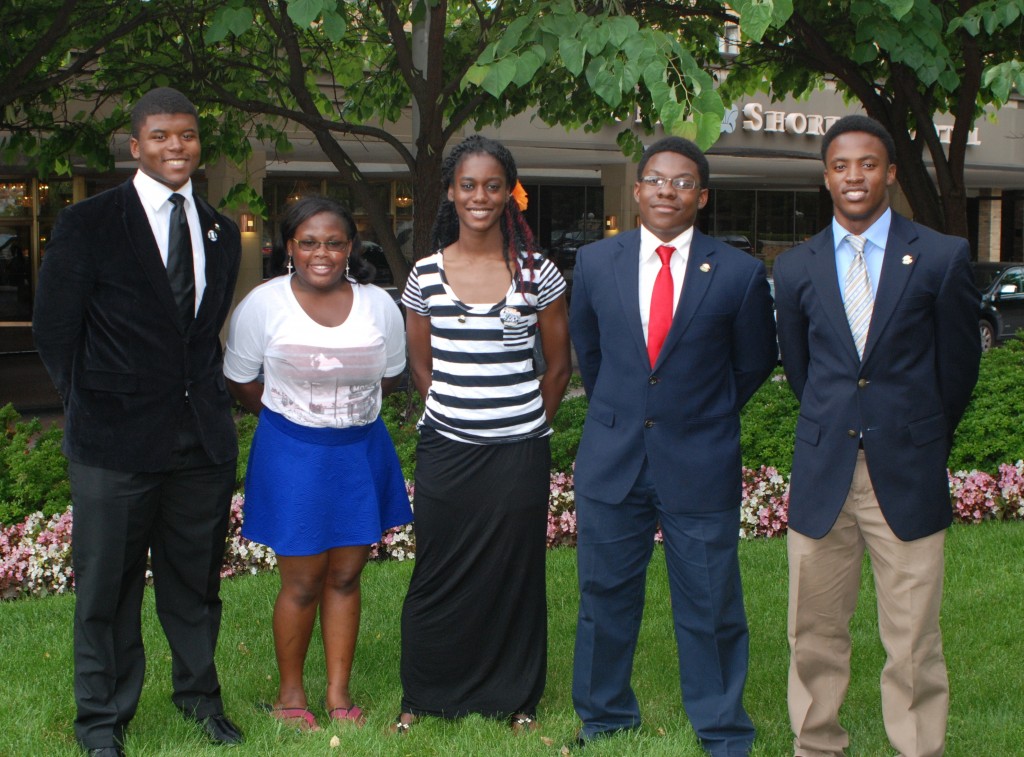Featured
McComb Students Teach and Learn in Washington, D.C.: 2014
On June 12, 2014, eleven students from McComb High School traveled to Washington, D.C. from Mississippi. In addition to competing in the National History Day competition, activities were scheduled for the youth to: (a) promote youth leadership and activism, (b) connect McComb youth with SNCC veterans and historians, (c) deepen knowledge of local D.C./national Civil Rights Movement history, and (d) introduce students to more institutions of higher education. Here are some photos and stories from their journey. (The bylines indicate sections written by students.)
Jump to a day: Day One | Day Two | Day Three | Day Four | Day Five | Day Six | Day Seven
Day One: Friday, June 13
By Sharon Botley
High School Presentation and Dialogue
Our first endeavor this morning was to travel and perform our play, “The Evolution of the Voting Rights of A Black Man: One Man, One Vote” at the Capital City Public Charter School. Mind you, this was our first time performing our play in front of another large, diverse group of high school students. But, the welcoming aura that this innovative school offered quickly set our nerves to rest. At the end of our performance, we were given ample applause and felt genuinely welcomed. Moreover, we were met with a string of inquisitive questions from our increasingly captivated audience which proved to be invaluable practice for NHD and served to boost our confidence in the relevancy of our topic.
Afterwards, the students and teachers broke us up into groups of two and three and led us into a few of the school’s classrooms for further discussion of our topic with the students of CCPCS. This, by far, was one of the most interesting parts of the day. Not only did we learn new slang words like “Ja like”, and “Guh”, but we also discovered that Capital City Public Charter School had a unique atmosphere which we were awed, captivated, and inspired by.
In our debrief at the end of the day, my classmates shared what they liked about the school:
- “The Capitol City High School has an amazing environment. Every individual student had their own sense of creativity. No one there was alike. They greeted us with a warm smile. I felt the freedom of every student there.” – Courtney Coney
- “Students determined the design of the new school building with an environmental focus.” -Teyiana Robinson
- “The student-teacher relationship.”- Damion Jordan
- “The student government appeared to run well because an 11th grade girl was running the ‘rising senior’ picnic.” – Vershunda Coleman
Newseum Exhibit on Freedom Summer
The students toured the Newseum, including the special exhibit on Freedom Summer.
Poetry and Politics of Education Workshop with the D.C. Youth Slam Team
In the evening, the McComb students and members of the D.C. Youth Slam team met at the Friends Meeting House for a workshop and dinner. Jonathan B. Tucker facilitated the exchange.
Day Two: Saturday, June 14
By Vershunda Coleman
Arlington National Cemetery
On June 14, 2014, we toured, Arlington Cemetery, led by high school teacher Julian Hipkins, III.
We learned that Arlington Cemetery is a national treasure for those who provided for our country. In the early 1800s, the cemetery was a plantation. Buried in the cemetery are men and women who have served in different branches of the military. There are also men and women who had been freed from slavery during the Civil War.
On our journey throughout the captivating destination, we viewed the eastern side of Arlington Cemetery.
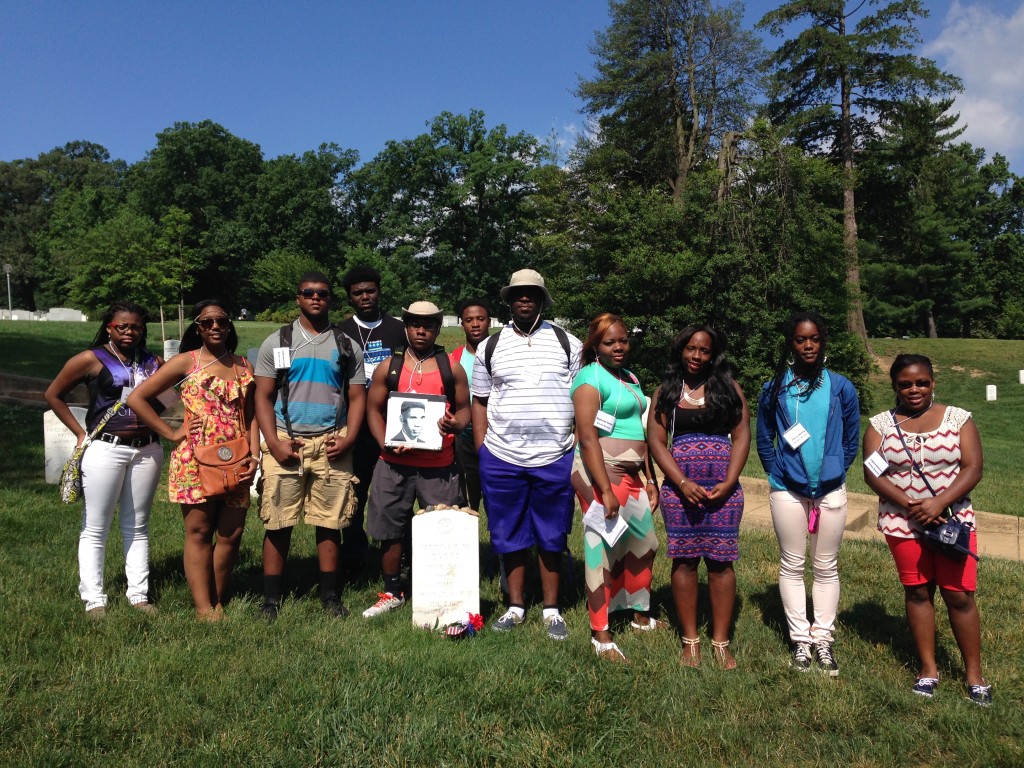
The first stop was the grave for Mississippi freedom fighter Medgar Evers, a WWII veteran who was killed for his fight for democracy in the U.S. on June 12, 1963.
Our stops included the grave sites for: Medgar Evers, the United States Colored Troops/USCT (including graves marked “Citizen” or “Civilian” referring to African-Americans who gained their freedom as a result of the Civil War), Joe Louis, John F. Kennedy, Thurgood Marshall, Arlington House; and the Tomb of the Unknowns.
We were joined on the tour by community organizer Neha Singhal, retired bilingual educator and Teaching for Change board member Sylvia Sanchez and her husband, college interns Rachel Mullins and Sarah Slichter, and two teacher education students from GWU, Tristan Brosnan and Lydia Parnell.
We had very powerful moments along the way. As we approached each grave, one student was asked to read a quote. Each quote gave us an insight and emotional appeal towards the honorable role models. The quotes brought forth what they fought and lived for. Those heroes changed a lot for not just me but for our entire country.
Here are some reflections from my classmates:
- “The cemetery was an amazing experience. It’s truly a memory I will never forget. It was awesome to finally see a place I’ve seen on T.V. and see the resting place of many famous figures and our brave soldiers.”—Israel Coleman
- “I was excited about Arlington because Mr. Evans me to really look at it and take pictures because when he was here he was younger and did not take advantage of it. So, I enjoyed taking many pictures. I found it ironic that the Arlington Cemetery claims to promote uniformity since headstones of the enslaved were tiny compared to the rich people’s big headstones. I took a photo to show the disparity.” – Sharon Botley
- “Today was one of the most important events we have attended. I truly liked this because it was based on people who are very important and whose legacy will forever be alive.” –Ronique Taylor
- “The Arlington Cemetery was way more than I thought it would be. I learned and saw things I’ve never seen before. I’m grateful to have had the opportunity.”—Damion Jordan
Day Three: Sunday, June 15
Flash Mob for Voting Rights at the Supreme Court
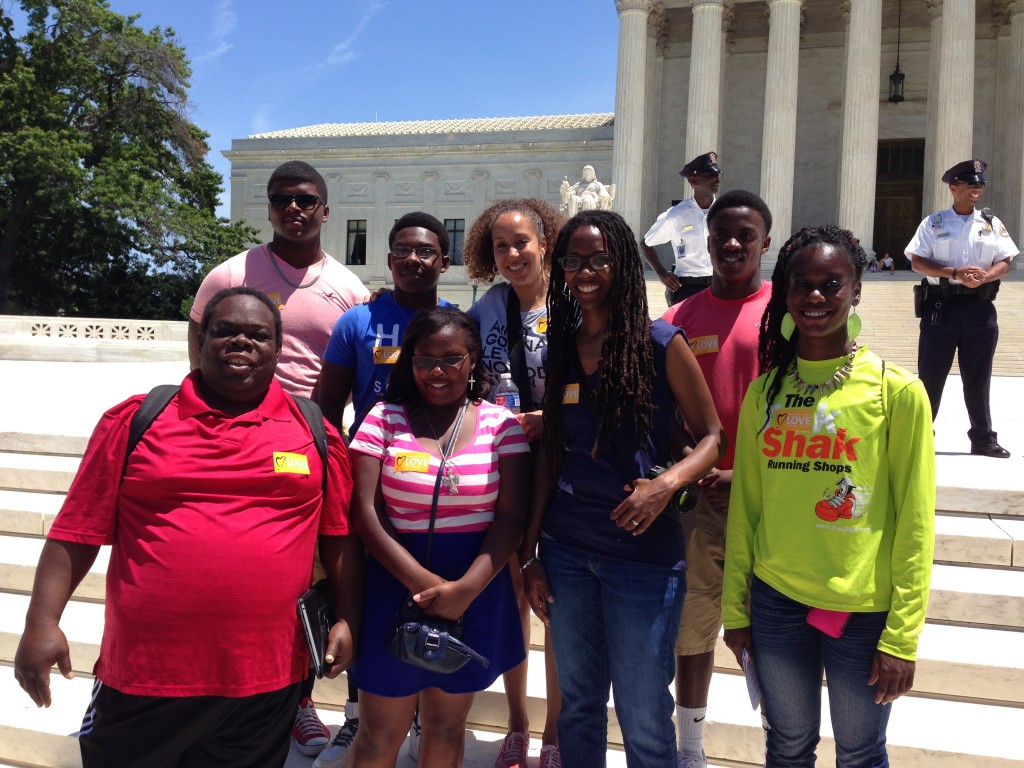
Teacher Larry Johns with students and two All Souls members (Michelle Molitor and Caroline Hill) who offered a seminar for the McComb School District on race and equity in education.
The All Souls Unitarian Church held a flash mob, as part of their People Get Ready Reeb Project, on the one-year anniversary of the gutting of the Voting Rights Act.
The McComb students who created the National History Day performance on the history of voting rights for African Americans joined this moving event. They met at All Souls where they learned the song, a variation of the 1965 “People Get Ready” by Curtis Mayfield, and then traveled to the front steps of the U.S. Supreme Court. The team from Mississippi was introduced to the more than 100 people in attendance.
The Reeb Project was named in honor of former All Souls associate minister James Reeb, who was beaten to death in 1965 in Selma, AL, where he had gone to march for voting rights.
Here is a short video of the event. Fast forward to 1:47 minutes to see the flash mob begin.
Frederick Douglass National Historic Site
The sunny weather made it a perfect day to visit the Frederick Douglass home in Anacostia. Traveling by metro and bus, the students first stopped at the visitor center to watch the orientation film. They then got a tour of Douglass’ home by a National Park Service ranger.
Returning to the visitor center, they met a local librarian who had attended the SNCC 50th anniversary gathering at Shaw. In response to her interest in their work, the McComb student performance group jumped into action and enacted their play on the spot. As more people walked into the visitor center for the upcoming tour, they stopped to watch. By the time the 10-minute play was over, the students had an appreciative audience.
National History Day
It was off to College Park for registration, opening ceremonies, and the state pin exchange at National History Day.
The two entries were “Education: a Civil Right and a Personal Responsibility” (Senior Group Documentary) and “The Evolution of the Voting Rights of a Black Man: One Man, One Vote” (Senior Group Performance).
The active participation of National History Day teams from Mississippi is co-coordinated by Renee McClendon. As a volunteer, she has made it her mission to support Mississippi students and teachers in their investigation and documentation of history.
Day Four: Monday, June 16
Howard University Tour
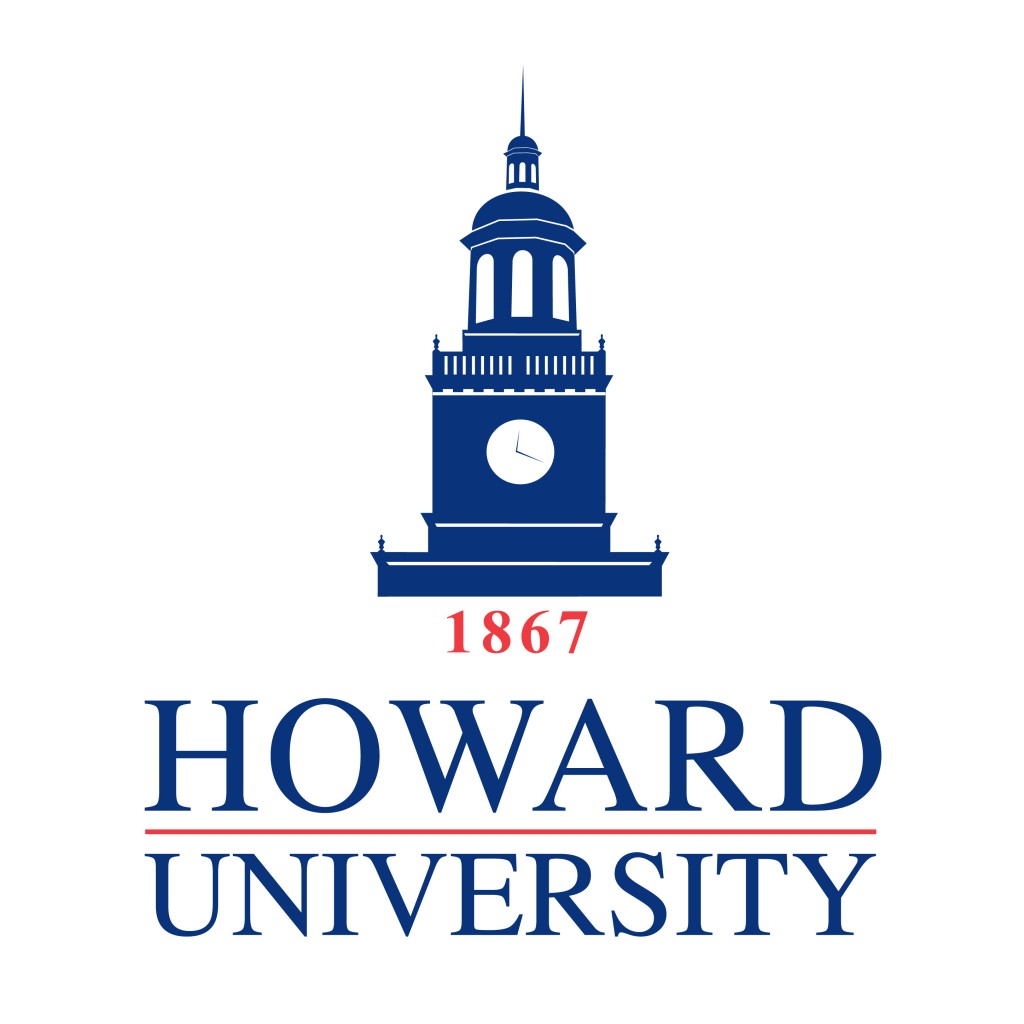 One group of the students took a campus tour of historic Howard University.
One group of the students took a campus tour of historic Howard University.
Another group of students took a tour of the Howard University Television (WHUT) station. There the WHUT production manager Sharon Drayton showed them both operating studios. They discussed the origins of the station and the nuances of public broadcasting. They also saw the audio and production control rooms, the edit stations, master control, and ingest work stations.
High School Presentation and Dialogue #2
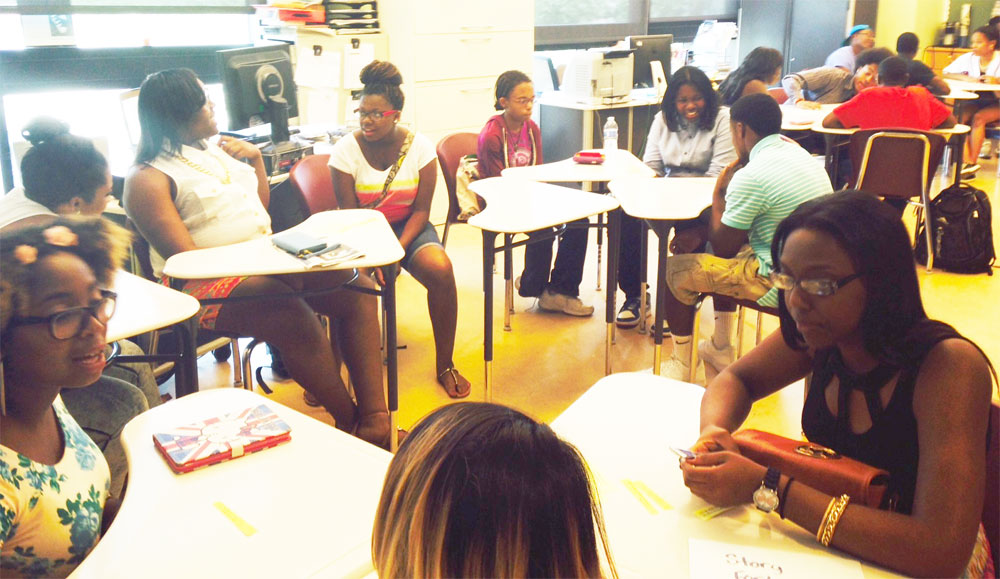
Students talk in small groups.
School Without Walls (SWW) high school teacher Kerry Sylvia and her students welcomed the McComb students to their class. Founded in 1971, School Without Walls is a D.C. public school that aims to use the city as its classroom.
The McComb students shared their documentary film on Freedom Schools and their performance on voting rights.
The SWW students asked thoughtful questions after each presentation.
Then the students got in small groups for a DC-McComb exchange on a variety of topics using story prompts. They talked about life in a small town compared to a big city, music, schools, family, aspirations, and more.
The visit ended with everyone going around the room and sharing something to know about their home town or something they learned from a peer during the session.
Day Five: Tuesday, June 17
University of Maryland Tour
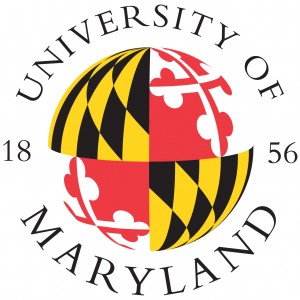 Since the National History Day competition was on the University of Maryland campus, a college visit was organized with the chance to meet students pursuing fields of study of interest to the McComb students. They began with a short tour of the campus conducted by University of Maryland students. They then heard brief presentations from students, faculty and staff in the James Clark School of Engineering, Office of Letters and Sciences (STEM), Department of Journalism, and Pre-Health Department. The students were pleased to learn about the Office of Multi-ethnic Student Education and the many resources for students of color, including the College Success Scholar and the Sister-2-Sister programs. The visit was coordinated by Dottie Chicquelo, Assistant Director at the Office of Multi-ethnic Student Education.
Since the National History Day competition was on the University of Maryland campus, a college visit was organized with the chance to meet students pursuing fields of study of interest to the McComb students. They began with a short tour of the campus conducted by University of Maryland students. They then heard brief presentations from students, faculty and staff in the James Clark School of Engineering, Office of Letters and Sciences (STEM), Department of Journalism, and Pre-Health Department. The students were pleased to learn about the Office of Multi-ethnic Student Education and the many resources for students of color, including the College Success Scholar and the Sister-2-Sister programs. The visit was coordinated by Dottie Chicquelo, Assistant Director at the Office of Multi-ethnic Student Education.
Reception at the African American Civil War Museum
Students shared their National History Day Projects at a reception at the African American Civil War Museum. There were 40 guests in attendance, including teachers, community members, and activists.
Dr. Frank Smith welcomed the attendees, providing some background on the museum and his own role as a SNCC activist in Mississippi. He introduced the two student MC’s, Vershunda Coleman and Lakevion Isaac.
The students presented their dramatic performance and an excerpt from their documentary. Damion Jordan provided background on the documentary, explaining why they selected the topic and their research process. Raykesha Carter said that Freedom Schools are needed today so that students can learn important skills rather than simply how to take a test. Teyianna Robinson introduced the performance with a story about her father who recently ran for mayor of McComb and lost. A larger voter turnout could have led to a different result. She hopes that the play will inspire people to exercise their hard won voting rights.
SNCC veterans Dorie Ladner, Joyce Ladner, and Timothy Jenkins spoke briefly about memories from Mississippi and the importance of activism today, especially in the face of new voting rights restrictions. Jenkins noted, “This is not a celebration of what has been accomplished, this is a date for a commitment to what we have yet to do. We can be better than we think we are, we did it once, and we can do it again.” [Read Jenkins’s full remarks here.]
During the midst of the reception, we received word that the student performance had advanced to the finals of National History Day. It is the first time a McComb team has made it this far.
The reception was a wonderful way to connect generations of activists and ensure that the important history of McComb and Freedom Summer continues to be passed on and celebrated.
Day Six: Wednesday, June 16
Finals
The performance group returned to the University of Maryland, having made it to the final round of the competition.
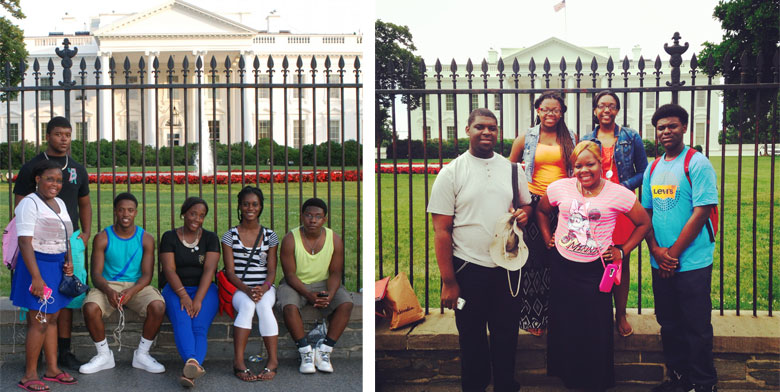
Squeezed in between other events, both the documentary and performance groups saw some of the national monuments and the White House.
Leadership and Anti-Oppression Workshop
At the St. Stephen’s Church, Iris Jacob offered a workshop for the youth on leadership and issues of race and identity.
Student Organizing
With just a short walk from St. Stephens, the group arrived at La Casa for a forum led by youth called: “Listen to the High School Students!” SMART Education forum. The McComb students had been invited to the forum by SMART youth who attended the reception at the African American Civil War Museum the night before. The youth-to-youth networking and collaboration were underway.
More than 50 immigrant English Language Learner (ELL) students from area public and public charter high schools hosted the hour-long forum to present the problems and solutions faced by English Language Learners to school district administrators.
A number of the McComb students commented that the youth advocacy was inspiring and left them thinking about how to bring some of that approach to education reform back home.
Book Talk: Birmingham, 1963
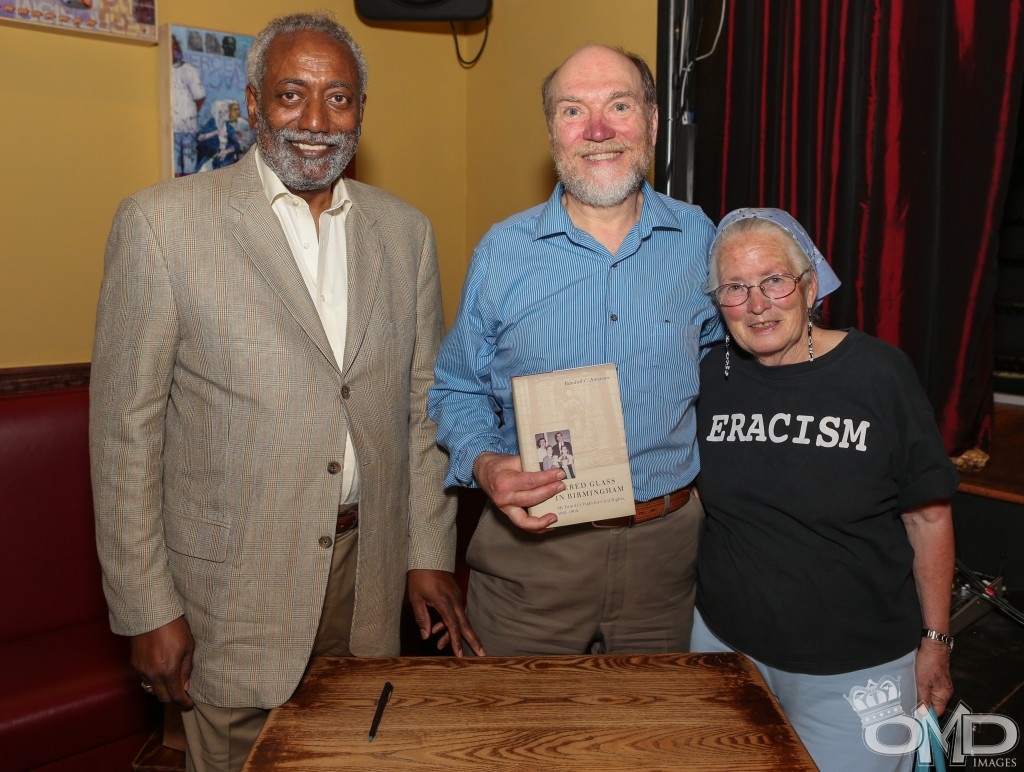
Panelists Amos Townsend and Randall C. Jimerson with Freedom Rider Joan T. Mulholland. Jimerson is holding his book, “Shattered Glass in Birmingham: My Family’s Fight for Civil Rights 1961-1964.” Photo (c) Omar M. Davis.
Half of the students attended a talk at Busboys and Poets called “Coming of Age at the height of the Civil Rights Era in ‘the most segregated city in America.'” Randall C. Jimerson and Amos Townsend spoke about growing up on different sides of the racial tracks in Birmingham. Before they spoke, a group of high school students from Iowa were invited to the stage to share their National History Day performance on the Birmingham Children’s March in 1963. Another National History Day team was in the audience from Pennsylvania. They had created a website, Confronting Bombingham. The event was centered around Jimerson’s publication Shattered Glass in Birmingham: My Family’s Fight for Civil Rights, 1961-1964 and coordinated by Ann Jimerson, founder of the website Kids in Birmingham, 1963. Also in attendance was Freedom Rider Joan Trumpauer Mulholland.
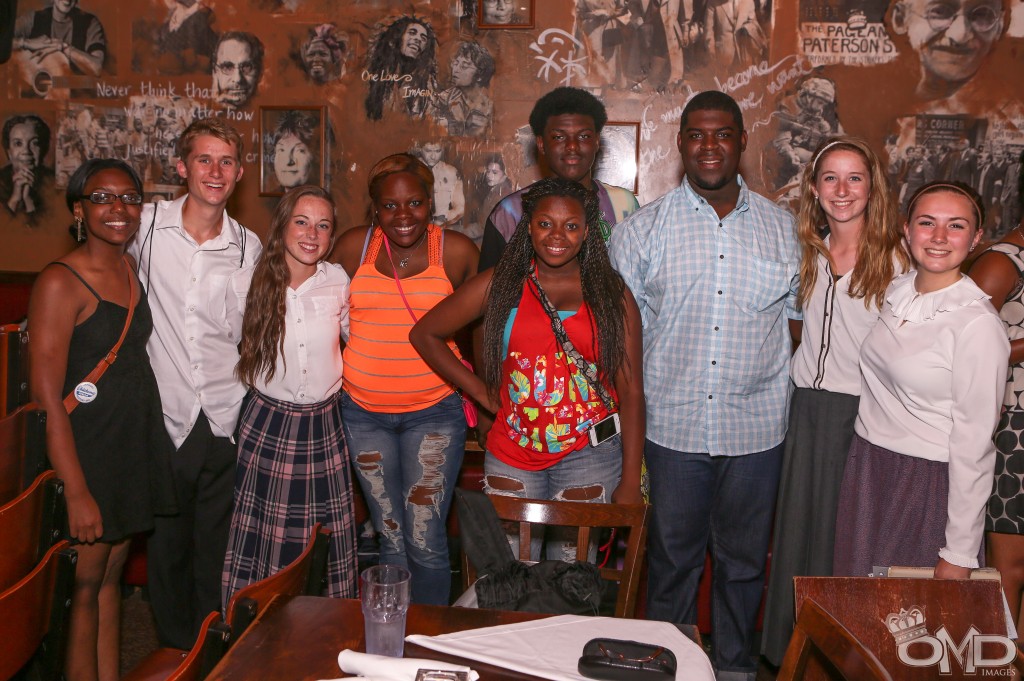
Students from McComb enjoyed meeting peers from Iowa and seeing their NHD performance on Birmingham in 1963. Photo (c) Omar M. Davis.
Day Seven: Thursday, June 17
NHD Closing Ceremony and Radio Show
The performance group went to the closing ceremony. There it was announced that they scored 7th in the nation in their division. This is a tremendous honor for McComb and the state of Mississippi.
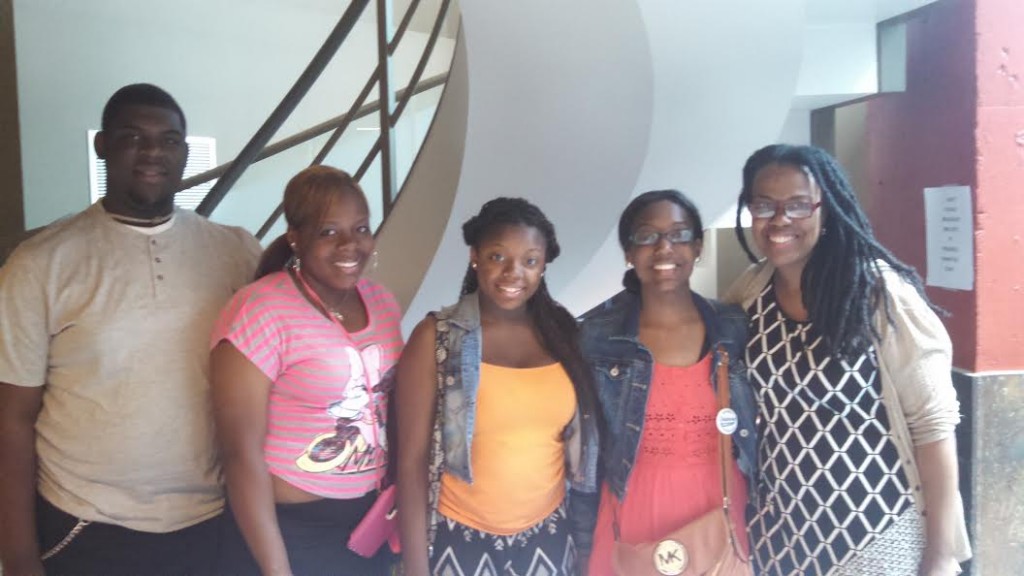
Damion Jordan, Raykesha Carter, Courtney Coney, and Vershunda Coleman at WPFW where they were interviewed by Esther Iverem.
Meanwhile, the documentary group represented McComb on WPFW radio. They were interviewed by Esther Iverem for the On the Ground Show. The McComb youth followed a segment earlier that morning on Freedom Summer 50 with Courtland Cox and Karen Spellman in studio and Albert Sykes, Daphne Chamberlain, Hollis Watkins, and Derrick Johnson on line.
Esther asked students about their National History Day projects and their concerns about education and voting rights today. Listen here. (The segment with the students begins at 12:20 minutes.)
Acknowledgments
The students on this trip were: Sharon Botley, RayKesha Carter, Israel Coleman, Vershunda Coleman, Courtney Coney, Lakeivion Isaac, Damion Jordan, Noah Martin, Teyiana Robinson, Kerwon Smith, and Ronique Taylor. Everyone they met commented on what fine representatives they were of their hometown of McComb, Mississippi. They fully engaged with every person and experience during the trip.
This trip was funded by the McComb School District and a W.K. Kellogg Foundation grant to Teaching for Change.
The activities and accommodations were planned by Teaching for Change fellow and youth organizer Neha Singhal.
On the ground support was provided by McComb staff Karmen Butler, Charla Johns, and Larry Johns; Teaching for Change interns Sarah Slichter and Rachel Mullins; and Teaching for Change executive director Deborah Menkart. Falana McDaniel assisted the film documentary group with preparation. Marco Esparza loaned his jeep for the week to assist with picking up luggage from the airport and transportation throughout the week to the University of Maryland and other sites. The students also used the Metro, circulator bus, and wore the soles off their shoes with miles of walking.
All the people named in bold in this article went above and beyond to make every visit and activity rewarding and memorable. Thank you.
Photos by Charla Johns and Deborah Menkart.
